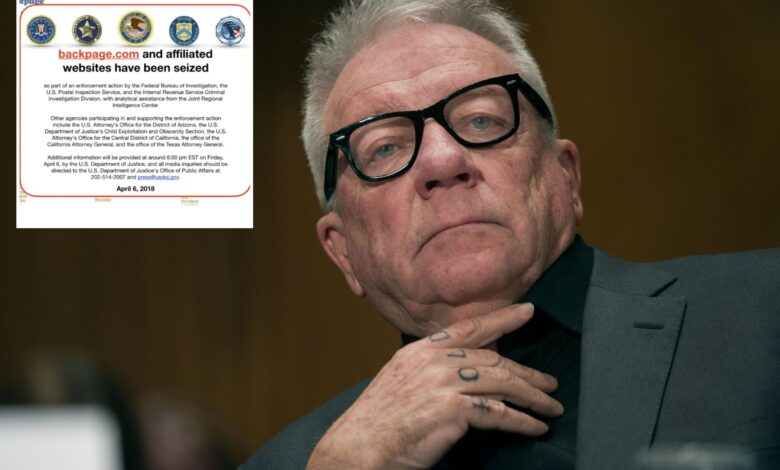Backpage.com founder Michael Lacey sentenced to 5 years

Michael Lacey, a founder of the lucrative classified site Backpage.com, was sentenced Wednesday to five years in prison and fined $3 million for a single money laundering count in a sprawling case involving allegations of a yearslong scheme to promote and profit from prostitution through classified ads.
A jury convicted Lacey, 76, of a single count of international concealment money laundering last year, but deadlocked on 84 other prostitution facilitation and money laundering charges. US District Judge Diane Humetewa later acquitted Lacey of dozens of charges for insufficient evidence, but he still faces about 30 prostitution facilitation and money laundering charges.
Authorities say the site generated $500 million in prostitution-related revenue from its inception in 2004 until it was shut down by the government in 2018.
Lacey’s lawyers say their client was focused on running an alternative newspaper chain and wasn’t involved in day-to-day operations of Backpage.
But during Wednesday’s sentencing, Humetewa told Lacey that he was aware of the allegations against Backpage and did nothing.
“In the face of all this, you held fast,” the judge said. “You didn’t do a thing.”
Two other Backpage executives, chief financial officer John Brunst and executive vice president Scott Spear, also were convicted last year and were each sentenced on Wednesday to 10 years in prison.
Prosecutors said the three defendants were motivated by greed, promoted prostitution while masquerading as a legitimate classified business and misled anti-trafficking organizations and law enforcement officials about the true nature of Backpage’s business model.
Prosecutors said Lacey used cryptocurrency and wired money to foreign bank accounts to launder revenues earned from the site’s ad sales after banks raised concerns that they were being used for illegal purposes.
Authorities say Backpage employees would identify prostitutes through Google searches, then call and offer them a free ad. The site also is accused of having a business arrangement in which it would place ads on another site that lets customers post reviews of their experiences with prostitutes.
The site’s marketing director has already pleaded guilty to conspiring to facilitate prostitution and acknowledged that he participated in a scheme to give free ads to prostitutes to win over their business. Additionally, the CEO of the company when the government shut the site down, Carl Ferrer, pleaded guilty to a separate federal conspiracy case in Arizona and to state money laundering charges in California.
Two other Backpage employees were acquitted of charges by a jury at the same 2023 trial where Lacey, Brunst and Spear were convicted of some counts.
At trial, the Backpage defendants were barred from bringing up a 2013 memo by federal prosecutors who examined the site and said at the time that they hadn’t uncovered evidence of a pattern of recklessness toward minors or admissions from key participants that the site was being used for prostitution.
In the memo, prosecutors said witnesses testified that Backpage made substantial efforts to prevent criminal conduct on its site and coordinated such efforts with law enforcement agencies. The document was written five years before Lacey, Larkin and the other former Backpage operators were charged in the Arizona case.




